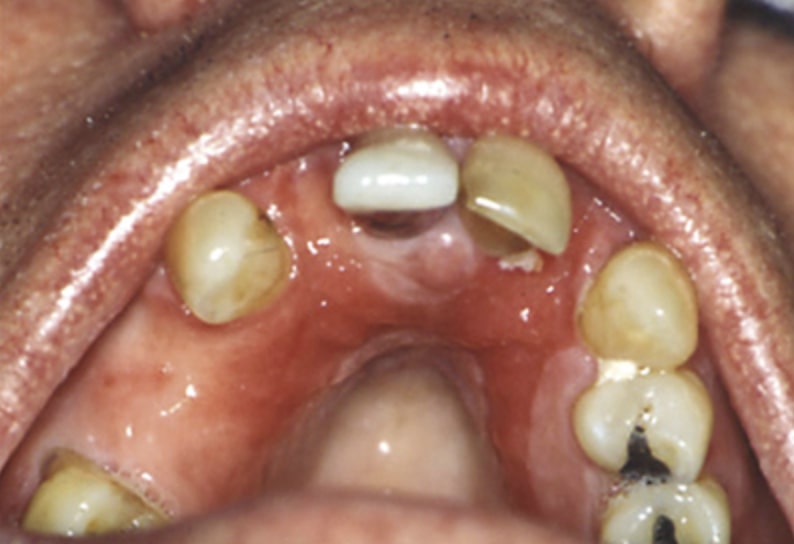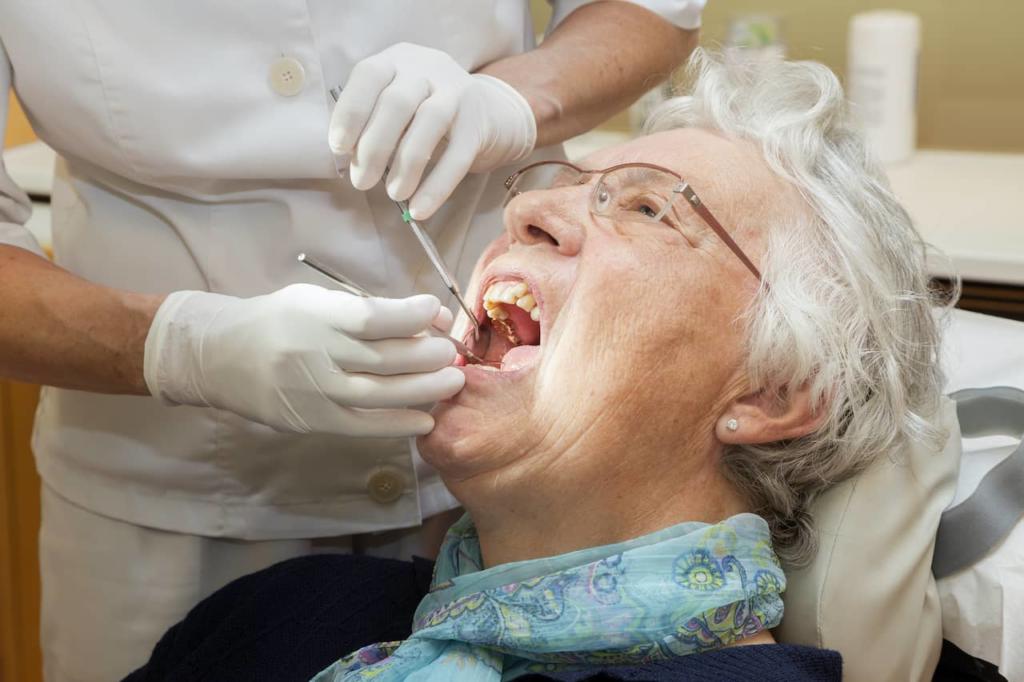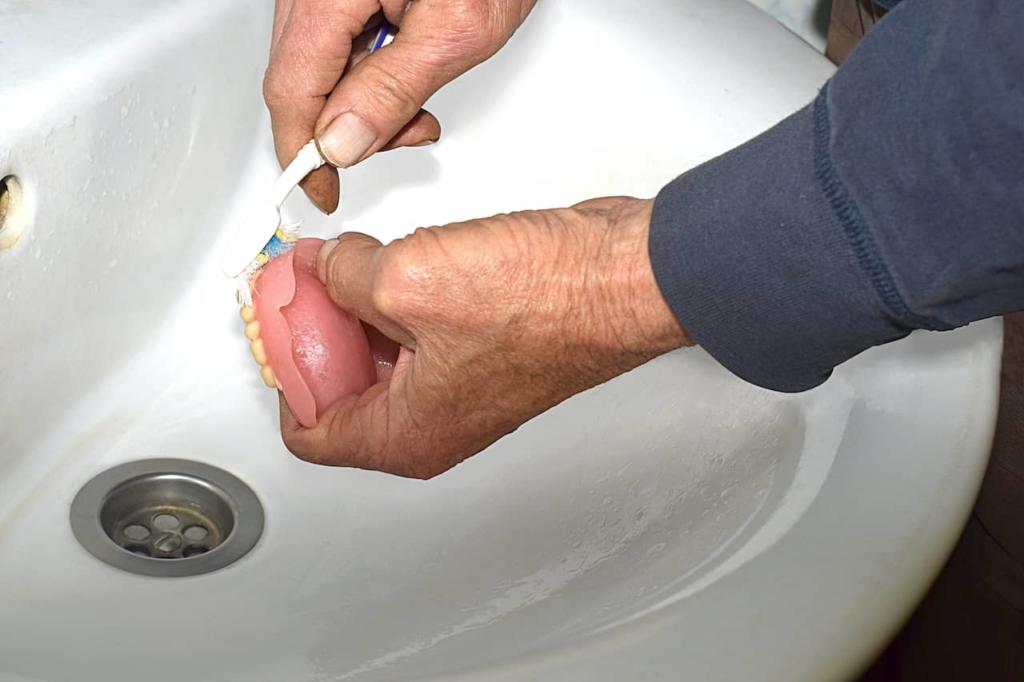
What is Denture Stomatitis and How Do You Treat It?
By David Hudnall, DMD
Denture stomatitis is a very common condition. So much so that it is not unusual for patients to have it without even realizing it. In fact, patients are often taken by surprise when a dental professional talks to them about having denture stomatitis during a routine oral exam.
Since many patients are completely asymptomatic, they fail to understand the importance of changing their routine even after diagnosis. Read on to learn about the causes of denture stomatitis and more.
What Is Denture Stomatitis?
Denture stomatitis is characterized by inflamed, puffy, red tissue that follows the outline of a denture or other dental appliance that rests against the oral mucosa. Sometimes the swollen tissue is accompanied by pin-points of bleeding. Fortunately, denture stomatitis is not life-threatening or a condition that can be passed onto others.
Is Denture Stomatitis a Fungal Infection?
Denture-induced stomatitis is the result of a yeast infection caused by the fungus Candida albicans, an opportunistic fungal pathogen found as part of the normal microflora in the human digestive tract.
This variety is one of approximately 200 different species of Candida. Candida albicans account for up to 75% of all Candida infections. It is the same fungus that also causes thrush.
Is Denture-Induced Stomatitis a Bacterial Infection?
Not exactly. It’s an overgrowth of yeast that thrives in the same environment along with many strains of bacteria. Dentures provide a warm, moist, dark reservoir that acts as a petri dish for the proliferation of both fungus and bacteria. Left unchecked, overgrowth of pathogenic bacteria in the mouth can lead to other oral conditions.
What Does Denture-Induced Stomatitis Look Like?
Here is an example of denture stomatitis caused by a partial denture. Notice the fiery-red outline of the partial on the patient’s palatal tissue.

Clinical denture-induced stomatitis photograph courtesy of PocketDentistry.com – a source for clinicians, students, and lecturers; copyright 2018; retrieved September 10, 2021.
How Common Is Denture Stomatitis?
Candida is present in everyone’s mouth, and it usually causes no problems. However, it’s the overpopulation of Candida in the mouth that actually causes the symptoms of denture stomatitis.
Epidemiological studies report the prevalence of denture stomatitis among denture wearers ranges anywhere from 15% to over 70%, depending upon the age of study participants. Elderly patients and nursing home patients tend to have a higher incidence of the condition.

Who Can Get Denture Stomatitis?
Anyone who wears dentures, partials, or orthodontic retainers where a portion of the oral tissue spends the majority of the time covered by the dental appliance can experience denture-induced stomatitis.
Patients with underlying health issues such as medication-induced dry mouth, diabetes, or immune suppression (i.e., cancer patients) have an increased susceptibility to opportunistic fungal overgrowth.
What Are the Causes of Denture Stomatitis?
Candida species seem to have a particular binding affinity to the rough acrylic surfaces of dentures. In addition, dentures that don’t fit properly can cause trauma that damages the tissue, making it more prone to infection.
Poor hygiene –– not removing all of the bacteria and debris formed on denture and tissue surfaces with daily brushing –– allows the normal fungus to multiply and get out of control. Finally, wearing dentures 24/7 dramatically increases the risk of contracting denture stomatitis.
What Are the Symptoms of Denture Stomatitis?
Aside from the red outline of the dental appliance, nearly 30% of all patients with denture stomatitis experience no symptoms at all. Of the remaining patients, 20% to 70% of them may notice bad breath, slight bleeding and swelling in the area involved, a burning sensation, dry mouth, or altered taste sensations in addition to the red outline.
How Is Denture Stomatitis Diagnosed?
Diagnosis is based on clinical appearance. The patient has denture stomatitis when the pattern of redness and swelling closely resembles the shape of the dental appliance in contact with the tissue. It occurs more frequently on the palate.
Further confirmation is usually not necessary. However, a definitive diagnosis may be obtained via microbiological swabs taken from the patient’s palate or the tissue side of the denture. Specimens will test positive for the presence of yeasts with Candida albicans being the most common yeast present.
How Is Denture Stomatitis Treated?
Primary denture stomatitis treatment involves the removal of dentures while sleeping and thorough cleaning of the dental appliances using a mechanical means to completely eliminate plaque and debris build-up.
For long-standing cases of denture stomatitis, the dentist may prescribe topical antifungal medications to apply to the denture-fitting surface and the oral mucosa. Oral antifungals can offer temporary relief of symptoms and reduce fungal count, providing an environment for the tissue to heal.
Are There Early Signs of Denture-Related Stomatitis?
Usually, the first sign of denture stomatitis is tissue redness in the shape of the denture. Since most patients don’t look inside of their mouths that closely every day, it usually goes undetected until a dental professional mentions it or actual symptoms occur.

Prevention of Denture Stomatitis
The best way to prevent denture stomatitis is to make removing your dentures before you go to sleep a habit. Your oral mucosa needs to be exposed to the air and to saliva that helps wash away bacteria and reduces the number of normal fungi present in your mouth.
Your dentures are a breeding ground for microorganisms and must be cleaned daily. The best way to accomplish this is to use a soft-bristle denture brush with liquid soap or a paste made especially for cleaning dentures to mechanically remove plaque and film that can lead to stomatitis.
Relying on soaking dentures in a cleansing solution alone doesn’t generate the agitation necessary to break up and wash away all of the debris hiding in the nooks and crannies of acrylic dentures.
Denture Materials Can Make a Difference
At European Denture Center, we offer a wide array of denture styles, suitable for any preference and budget. Our Digital Dentures and Implant-supported Dentures are milled from the very highest-quality materials available. This innovative milling process allows these dentures to fit better and last longer than most traditionally processed dentures.
In addition, they are less prone to voids and rough surfaces that can harbor odor-causing microorganisms which produce the symptoms of denture stomatitis. When it comes to making the best choice for your overall health and comfort, trust European Denture Center. We have the solution! See our full line of dentures and give us a call at 866-428-0505.

